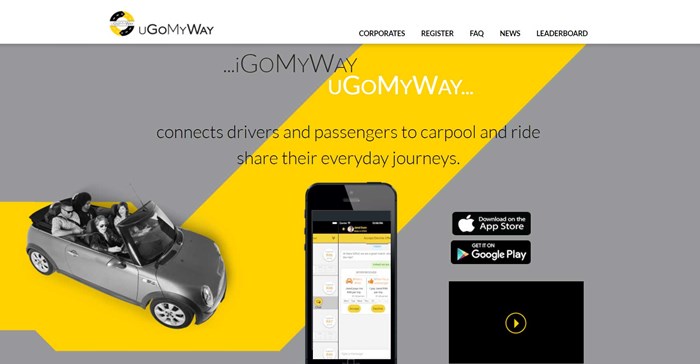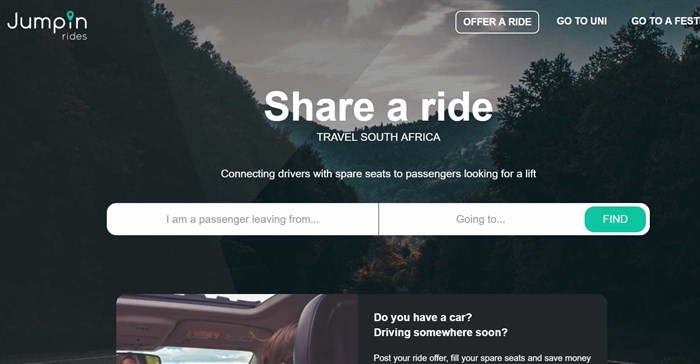
Top stories






AutomotiveHilux Custom Builds offers purpose-built solutions for your business
Toyota South Africa Motors 16 Feb 2026
More news


Marketing & Media
Ads are coming to AI. Does that really have to be such a bad thing?














In 2013, the TomTom global traffic index revealed that Cape Town is the most congested city in South Africa, with a global ranking at 55th place. The same survey revealed that traffic peak times have increased from two hours (7am–9am) to four (6am–10am) and that most of the congestion is caused by vehicles with single occupants.
Nationally, the figures are much the same; there are over 10 million cars on the road and 70% of these vehicles have three empty seats, leaving 20 million empty car seats in South Africa.
The city of Cape Town’s draft travel demand management strategy (TDMS) was issued for public participation in October 2016 when it asked the public to comment on the city’s proposals on how to change motorists’ travel behaviour.
Said city of Cape Town’s mayoral committee member for transport and urban development, councillor Brett Herron: "The only way out of constant gridlock is by changing our travel patterns and our over-reliance on private vehicles. The strategy proposes practical solutions. For example, by implementing flexible working hours or remote working arrangements for employees, we will have fewer private vehicles on the arterial routes during the traditional peak-hour periods."
According to a report on Wheels24, Herron said: "The city will lead by example. As a large employer, we expect our implementation of this strategy to lead the way and in the next few months some officials will be allowed to work remotely from satellite offices for a number of days or hours a week, to begin and end working at non-standard times within limits set by management, or to work from home during the peak and then travel to work during the off-peak period."
Although the TDMS mainly focuses on the interventions that the City can make with respect to infrastructure, residents and local businesses – in particular those in the CBDs – are encouraged to explore similar possibilities.
The TDMS also proposes that we make sustainable travel choices such as using public transport services, walking or cycling where feasible, or carpooling.
CarTrip founder, Chris Faure says, “Given the size of our population and the number of cars and empty seats on the roads, sharing your car with two or three other passengers could reduce traffic by more than 50%.”
Faure adds that each carpool of three people saves approximately five tons of CO2 emissions annually and 2200 litres of petrol, with acres of parking space made available.
All these new carpooling platforms have one thing in common: to simplify getting from point A to point B, to save money on travel costs, and to lessen the traffic on our roads.
CarTrip is an internet-based ridesharing platform, whereby car drivers and potential passengers can connect using a website or mobile application. The driver is travelling from one destination to another destination, independent of any passengers, and can pick up and drop them off along the way, with minor deviations, for the convenience of the pickup and drop-off.

Find a ride or offer a ride and make friends with CarTrip by simply following three easy steps:
1. Find a ride: Find a ride with a trusted and reviewed driver or offer a ride to a passenger.
2. Make a booking: Once you have found your ride, chat to your driver to make an arrangement and then book online, it's easy.
3. Travel together: You can now meet at the agreed point and enjoy a trip together. You'll make new friends, and save money.
Website: www.cartrip.co.za.
uGoMyWay is a carpooling pilot launched through Accelerate Cape Town (ACT). Together with a few of its corporate members based in the CBD, ACT has partnered with locally designed, built and maintained mobile app uGoMyWay, to remove excess cars from the roads by connecting drivers and passengers to each other to share their everyday journeys.

Available on iOS and Android, uGoMyWay allows users to create routine journeys such as home-to-work or home-to-school. Matches are then ranked and a chat function allows users to establish a dialogue before personal details are exchanged. Once this has taken place, users decide who will drive and what the shared costs will be. As an additional safety measure, users can also request to be a part of a ring-fenced community, which includes only members of their specific workplace or school.
While still in its early stages, Chris Megan, co-founder of the platform, says the results of the pilot to date are positive and encouraging, with over 90% of users finding matches and which can then result in carpooling. “Large-scale carpooling has huge benefits if you consider that every carpooling participant takes another car off the road, resulting in less congestion,” says Megan. “Real-time rideshare technology has the greatest potential to help solve the traffic congestion on our roads.”
“Aside from CBDs, we also see the app as being of particular value in university towns where young people are already mindful of the need to reduce energy use, are savvy about saving costs and of the added benefits of building new communities of like-minded people.”
Website: www.ugomyway.com.
JumpIn Rides, inspired by BlaBlaCar, is a carpooling platform which connects drivers with empty seats with people looking for a lift. It's also a way to save money on fuel costs and an opportunity to meet new people and make new friends. It's a secure and safe platform which focusses mainly on long distance travel and festivals and events.

All you need to do is register with your Facebook account and then provide more detailed information such as name and surname, phone number, ID number etc.
JumpIn Rides was started and supported by incubator and accelerator programme, Far Ventures.
Website: www.jumpinrides.com.
